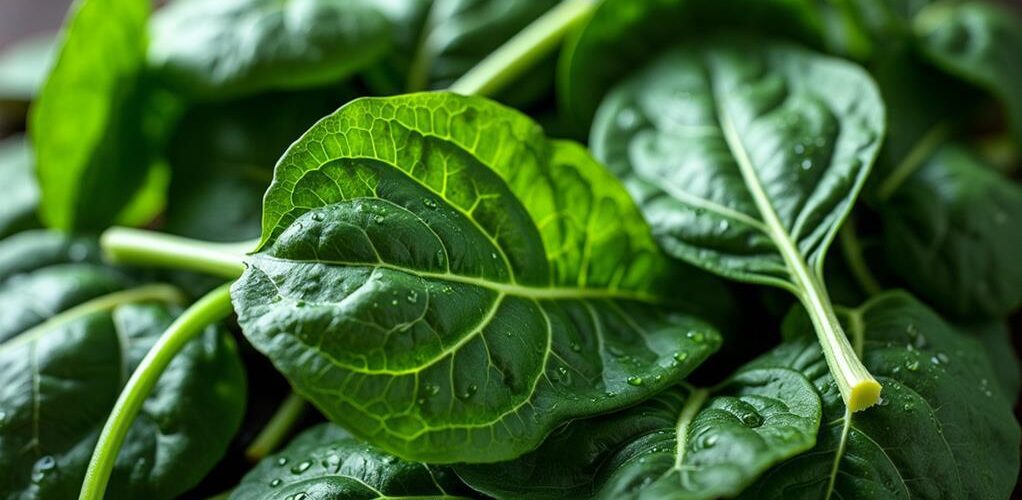
Following a keto diet requires consuming vegetables that are low in carbohydrates but rich in nutrients. Avocados top the list with their healthy fats and minimal net carbs. Broccoli and cauliflower provide fiber and antioxidants while maintaining low carb counts. Dark leafy greens, such as spinach, are exceptionally low in carbohydrates and loaded with vitamins. Zucchini is hydrating and versatile, filling meals without adding excess carbs. Cabbage offers a balance of fiber and vitamins, and Brussels sprouts bring beneficial antioxidants and essential nutrients. These choices support ketosis and offer a range of health benefits, inviting more exploration into their varied uses.
Key Takeaways
- Avocados are keto-friendly with only 2 grams of net carbs per 100 grams.
- Broccoli offers 4 grams of net carbs per cup and is rich in vitamins C and K.
- Dark leafy greens like spinach are extremely low in carbs, with about 1.1 grams per cooked cup.
- Cauliflower is an ideal keto vegetable, providing just 3.2 grams of net carbs per cup.
- Zucchini has only 3.1 grams of carbohydrates per 100 grams, making it suitable for ketogenic diets.
Avocados
Among the many vegetables and fruits suitable for a ketogenic diet, avocados stand out due to their exceptional nutritional profile. With approximately 8.5 grams of total carbohydrates per 100 grams, avocados are particularly favorable for keto enthusiasts because they contain only about 2 grams of net carbs, thanks to their high fiber content. This makes them an ideal low-carb option, allowing individuals to enjoy their creamy texture and rich taste without compromising their dietary goals.
Much like arugula, which is low in carbs and rich in vitamins, avocados also provide numerous health benefits. A key component of avocado nutrition is their abundance of healthy monounsaturated fats. These fats not only support heart health but also promote satiety, making avocados an excellent addition to any meal.
In addition, avocados are a potent source of potassium, providing 485 mg per 100 grams, essential for maintaining electrolyte balance, especially on a ketogenic diet.
Avocados are highly versatile in the kitchen, lending themselves to a variety of avocado recipes. They can be effortlessly incorporated into salads, smoothies, or used as a creamy spread.
Moreover, avocados are rich in essential vitamins and minerals, including vitamin E, vitamin K, and B vitamins, enhancing their nutritional value. This multifaceted fruit remains a staple for anyone pursuing a ketogenic lifestyle.
Broccoli
Broccoli is a nutrient-dense powerhouse, offering approximately 6 grams of total carbohydrates and 4 grams of net carbs per cup, making it ideal for a keto diet.
This vegetable is not only rich in vitamins C and K but also provides essential fiber that aids digestion and enhances satiety.
Incorporating broccoli into your meals can help support immune function and bone health.
With versatile cooking options such as steaming, roasting, or adding to soups, broccoli seamlessly integrates into various keto meals, providing both nutritional and culinary benefits.
Nutrient-Dense Powerhouse
A staple in the domain of low-carb diets, this vibrant green vegetable, broccoli, stands out as a nutrient-dense powerhouse ideal for those adhering to a ketogenic lifestyle. With only 6 grams of net carbs per cup, broccoli is a suitable choice for maintaining ketosis.
Its nutrient density is particularly impressive due to its rich content of vitamins C and K. Each serving provides 81.2 mg of vitamin C, known for its role in bolstering the immune system, and 116% of the recommended daily value of vitamin K, essential for bone health and blood clotting.
Beyond its vitamin content, broccoli's health impacts are further enhanced by its high fiber content, promoting digestive health and aiding in satiety, vital for those on a low-carb diet.
Additionally, the presence of antioxidant compounds in broccoli contributes to immune support and overall health, aligning with the benefits sought through a ketogenic diet. These antioxidants help mitigate oxidative stress, which is linked to chronic diseases.
Broccoli's unique combination of low carbohydrates, essential vitamins, and fiber positions it as a key component in optimizing health on a keto diet, offering both nutritional and health advantages.
Versatile Cooking Options
Building upon its nutritional advantages, the versatility of broccoli in culinary applications greatly enhances its appeal for those on a keto diet. With only 6 grams of net carbs per cup, broccoli's compatibility with low-carb meal plans is undisputed.
Its adaptability in cooking techniques such as steaming, roasting, or sautéing allows it to complement a variety of dishes, from salads to casseroles. The mild flavor profile of broccoli guarantees it blends seamlessly in stir-fries and soups, adding both nutritional value and textural contrast.
Broccoli's utility extends beyond traditional preparations. It serves as an effective ingredient substitution for higher-carb staples. When riced, it becomes a low-carb alternative to rice, providing a similar texture without the excess carbohydrates.
Similarly, when mashed, broccoli can replace potatoes, maintaining the creamy consistency desired in various recipes. These substitutions not only align with keto dietary requirements but also expand the range of meal options available.
Nutritionally, broccoli's richness in vitamins C and K enhances its value, promoting health benefits that support a ketogenic lifestyle.
Its diverse cooking applications, coupled with its potential as a low-carb substitute, make broccoli an indispensable component in a keto-friendly kitchen.
Dark Leafy Greens
Dark leafy greens are a fundamental part of the keto diet due to their exceptionally low carbohydrate content and high nutritional value. Spinach, for instance, contains only 1.1 grams of total carbs and 0.4 grams of net carbs per cooked cup, making it an ideal choice for maintaining ketosis.
These greens are also abundant in essential vitamins and minerals, particularly vitamin K, which is vital to nutrient absorption, blood clotting, and bone health. To optimize the benefits, incorporating dark leafy greens into your meal prep can guarantee a consistent supply of these nutrients, supporting overall well-being on a keto diet.
Furthermore, dark leafy greens are rich in antioxidants, which combat oxidative stress and reduce inflammation, essential for anyone looking to maintain peak health. This is particularly beneficial as the ketogenic diet modulates immune response by balancing pro-inflammatory and anti-inflammatory cytokines.
The dietary fiber content in these greens supports digestive health, promoting regularity and preventing constipation, a common concern on low-carb diets.
The versatility of dark leafy greens allows them to be seamlessly integrated into a variety of dishes, such as salads, smoothies, and cooked meals, adding substantial nutrition and volume without a significant increase in carbohydrate intake. This makes them an indispensable component of any well-rounded keto meal plan.
Cauliflower
Cauliflower stands out as a quintessential choice for the ketogenic diet due to its low carbohydrate content of only 3.2 grams of net carbs per cup, making it ideal for maintaining ketosis.
Its culinary adaptability allows it to replace higher-carb ingredients in dishes such as rice, pizza crust, and mashed potatoes, without compromising taste. Additionally, cauliflower is not only low in calories but also rich in vitamins C and K, offering immune support and bone health benefits while its fiber content aids digestion and enhances satiety.
Moreover, cauliflower can be a staple in vegetarian keto diets as it pairs well with other low-carb vegetables like spinach and zucchini.
Nutrient Profile Highlights
A notable component of the keto diet's appeal is its emphasis on low-carbohydrate vegetables, and cauliflower stands out as a prime example. When conducting a nutritional comparison, cauliflower emerges as an exemplary choice due to its low carbohydrate content. Specifically, it contains only 5.3 grams of total carbohydrates and approximately 3.2 grams of net carbs per cup, making it a superior option for those adhering to the keto diet. Additionally, cauliflower provides around 2 grams of dietary fiber per cup. This fiber content is essential for promoting digestive health and ensuring prolonged satiety, which is particularly beneficial for individuals seeking to maintain a low-carbohydrate intake.
Beyond its fiber and carbohydrate profile, cauliflower is abundant in essential vitamins and antioxidants. It offers 46 mg of vitamin C and 16 mcg of vitamin K per cup, contributing considerably to immune function and bone health. These nutrients are critical in supporting overall well-being, particularly on a diet that restricts certain food groups.
The presence of antioxidants further enhances its nutritional value by potentially reducing inflammation and lowering the risk of chronic diseases. Consequently, cauliflower not only aligns with the ketogenic dietary framework but also offers a robust nutrient profile that supports health.
Versatile Culinary Uses
Building upon its impressive nutrient profile, cauliflower also shines in the culinary domain due to its adaptability in low-carbohydrate meal preparation. One of the most celebrated uses of cauliflower in keto-friendly cuisine is its transformation into cauliflower rice. This involves grating or processing the vegetable until it resembles the texture of rice, providing a versatile base for an array of dishes without the high carbohydrate content of traditional grains. With only about 3 grams of net carbs per cup, cauliflower rice enables individuals to maintain ketosis while enjoying a variety of meals.
In addition to serving as a rice substitute, cauliflower can be fashioned into a cauliflower pizza crust. This low-carb alternative to conventional pizza dough allows keto enthusiasts to enjoy a beloved dish without compromising their dietary goals. The mild taste of cauliflower absorbs spices and seasonings effectively, making it suitable for diverse culinary applications across different cuisines.
Additionally, cauliflower can be roasted, steamed, sautéed, or blended into soups, each method enhancing its flavor and texture. Such versatility not only supports dietary adherence but also enriches the culinary experience for those following a ketogenic lifestyle.
Health Benefits Overview
Often overlooked in favor of its more colorful counterparts, this cruciferous vegetable offers a wealth of health benefits that make it a standout in the domain of low-carb diets. Cauliflower, with only 5.3 grams of total carbs and 3.2 grams of net carbs per cup, is a nutritional powerhouse ideal for those adhering to a ketogenic lifestyle. Its low carbohydrate content makes it an excellent low-carb alternative to starchy foods, such as rice and potatoes, without sacrificing taste or versatility.
The nutritional benefits of cauliflower extend beyond its macronutrient profile. Rich in vitamins C and K, it plays a significant role in supporting immune function and promoting bone health.
Additionally, its high fiber content aids in digestive health and helps maintain satiety, which is beneficial for weight management. Fiber also plays a significant role in maintaining healthy blood sugar levels, an important factor for those following a ketogenic diet.
Cauliflower also contains antioxidants and anti-inflammatory compounds, which may reduce the risk of chronic diseases. These properties not only enhance overall health but also align with the dietary goals of keto enthusiasts seeking to maximize nutritional intake while minimizing carbohydrate consumption.
Zucchini
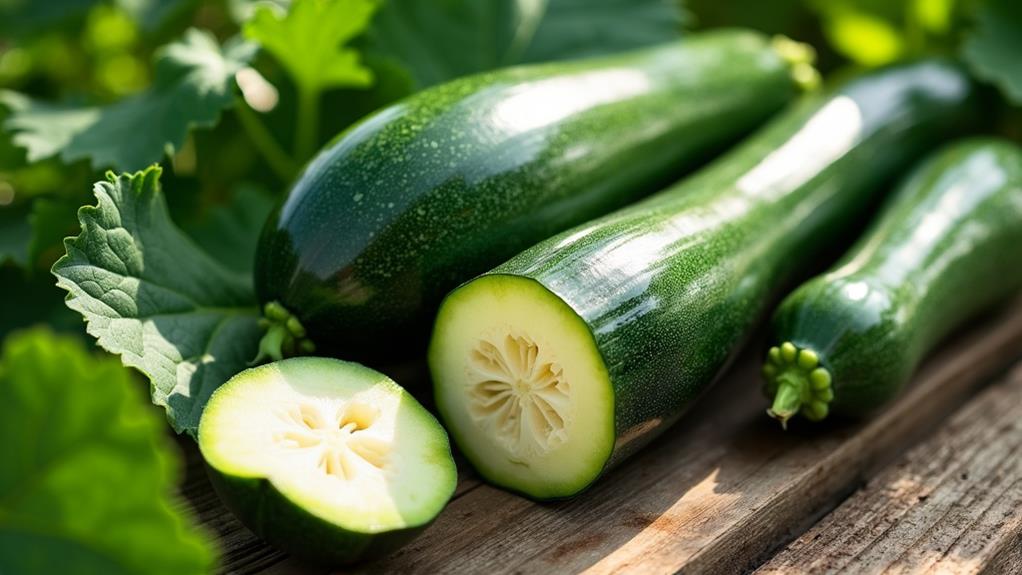
Zucchini, a nutrient-dense vegetable, is an exceptional choice for those adhering to a ketogenic diet due to its low carbohydrate content, with only 3.1 grams per 100 grams. Its versatility is showcased through various zucchini varieties, such as the classic green zucchini and the yellow zucchini, each offering subtle taste differences and nutritional benefits. These varieties can be incorporated into numerous zucchini recipes, enhancing meal diversity while keeping carb intake low. The vegetable's high water content, approximately 95%, aids hydration and adds volume to meals without considerably increasing calorie intake.
Zucchini is not only low in carbohydrates but also rich in vitamin C, providing about 17% of the recommended daily intake per 100 grams. This contributes to immune function and skin health, making it a valuable addition to a balanced diet. In addition, with 1 gram of fiber per 100 grams, zucchini supports digestive health and enhances satiety, which is essential for maintaining a ketogenic lifestyle.
Below is a comparative table showcasing the nutritional profile of zucchini:
| Nutrient | Amount per 100g |
|---|---|
| Carbohydrates | 3.1g |
| Vitamin C | 17% RDI |
| Water Content | 95% |
| Fiber | 1g |
Zucchini's versatility and nutritional benefits make it a staple in keto-friendly dishes.
Cabbage
Another valuable addition to a ketogenic diet is cabbage, a low-carb vegetable with approximately 5.8 grams of total carbohydrates per 100 grams. This cruciferous vegetable is not only low in carbohydrates but also provides a significant nutritional boost.
Cabbage is rich in vitamin K, offering 274% of the recommended daily allowance per serving, which is essential for bone health and blood clotting. In addition, it contains about 2.5 grams of fiber per 100 grams, which supports digestive health and helps promote satiety, making it a strategic choice for those aiming to maintain a low-calorie intake.
Moreover, cabbage can contribute to improved insulin sensitivity, an important factor for those managing type 2 diabetes through a ketogenic diet.
Cabbage varieties such as green, red, and savoy allow for diverse culinary applications, expanding the range of cabbage recipes suitable for a keto diet. Whether enjoyed raw in salads, fermented into sauerkraut, or cooked in stir-fries and soups, cabbage's versatility in meal preparation guarantees that it can be seamlessly integrated into various dishes.
With only around 25 calories per 100 grams, cabbage is an excellent ingredient for creating satisfying, nutritious, and low-calorie meals. Its adaptability and nutrient density make it a standout vegetable for those committed to a ketogenic lifestyle.
Brussels Sprouts
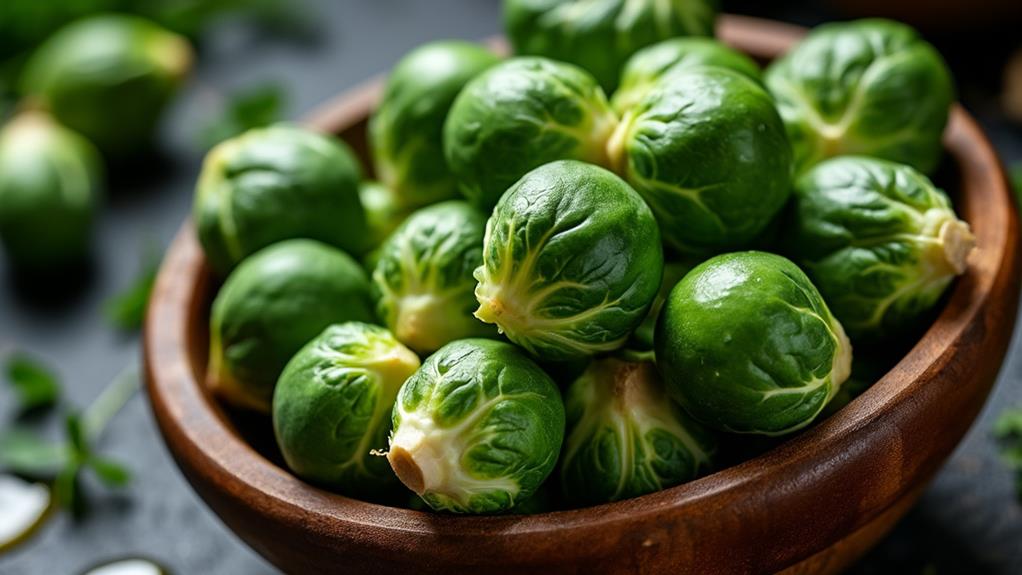
Brussels sprouts are a nutrient-dense, low-carb vegetable ideal for those adhering to a ketogenic diet. Containing just over 5 grams of net carbs per 100 grams, they fit seamlessly into low-carb meal plans. Furthermore, their high fiber content of approximately 3.8 grams per 100 grams aids in promoting digestive health and enhancing satiety, making them a valuable addition to any keto-friendly regimen.
The nutritional benefits of Brussels sprouts extend beyond their fiber content. They are particularly rich in vitamins K and C, with 100 grams providing 274% of the recommended daily allowance (RDA) for vitamin K and 97% for vitamin C. These vitamins play vital roles in blood clotting and immune function, respectively.
Additionally, Brussels sprouts contain antioxidants and compounds that may help reduce cancer risk, further improving their healthful profile. Curiously, a keto diet itself may offer potential cancer benefits, making Brussels sprouts an even more attractive option for those on this diet.
Brussels sprouts offer versatility in cooking techniques, which can enhance their flavor and nutritional retention. They can be:
- Roasted to bring out a nutty, caramelized taste
- Sautéed for a quick, flavorful side dish
- Steamed to preserve their nutrients
- Incorporated into casseroles for added texture
- Used in stir-fries for a nutrient boost
These cooking methods guarantee that Brussels sprouts remain a versatile and nutritious component of a ketogenic diet.
Frequently Asked Questions
What Vegetables Are OK on Keto?
When considering keto-friendly greens and low-carb options, spinach, kale, broccoli, cauliflower, zucchini, bell peppers, and avocados are recommended. These vegetables provide essential nutrients while maintaining low net carb counts suitable for ketogenic dietary requirements.
What Are 7 Great Vegetables to Cut Down on Carbs?
For individuals seeking to reduce carbohydrate intake, selecting low carb options such as spinach, zucchini, cauliflower, broccoli, and bell peppers offers significant vegetable benefits. These choices provide essential nutrients while maintaining dietary goals in a precise manner.
What Are the Top 10 Keto Foods?
The top 10 keto foods include low-carb vegetables, healthy fats like avocados, and high-quality proteins. Keto food swaps and low carb recipes often feature spinach, kale, cauliflower, and fatty fish, emphasizing unprocessed, nutrient-dense options.
What Are the Best Snacking Vegetables for Keto Diet?
When considering keto-friendly snacking vegetables, cucumbers, celery, bell peppers, radishes, and zucchini emerge as excellent choices. Their low-carb content and compatibility with keto-friendly dips make them ideal crunchy veggie options for maintaining ketosis.
Conclusion
To sum up, the ketogenic diet necessitates careful selection of vegetables to maintain low carbohydrate intake while ensuring nutritional adequacy. Avocados, broccoli, dark leafy greens, cauliflower, zucchini, cabbage, and Brussels sprouts emerge as ideal choices due to their low carbohydrate content and high nutrient density. These vegetables provide essential vitamins, minerals, and fiber, supporting metabolic health and facilitating adherence to the diet's macronutrient requirements. Incorporating these vegetables can enhance dietary variety and contribute to the overall success of a ketogenic dietary regimen.
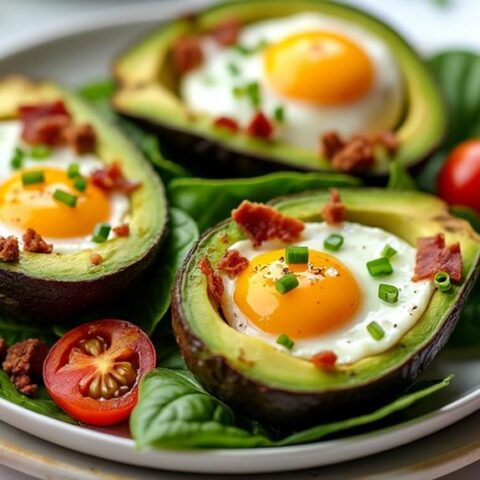
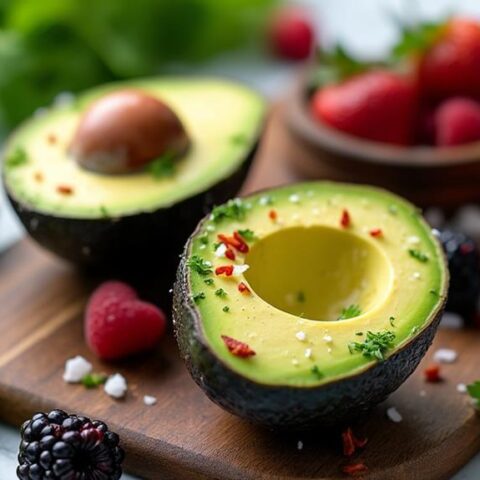

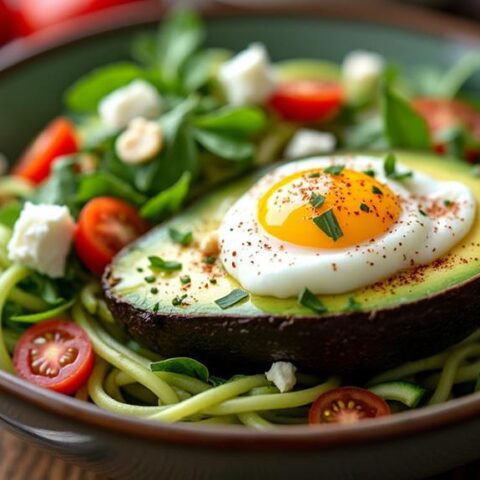




No Comments